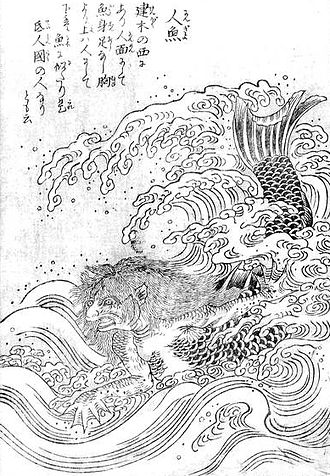Cecaelia is a modern term for a mermaid with an octopus lower body, instead of a fish. I have read that such legends come from ancient Native American and Japanese culture. Does anyone know their original names for these creatures?
-
1Welcome to M&F StackExchange! Not good enough for an answer, but wanted to mention you will also find these referred to as "sea witches." Of course, a Google search will eventually bring up the Disney character Ursula, which they say is something called an "octopin," but I can't find anything else on what octopins are supposed to be.– DanCommented Mar 6, 2020 at 16:35
3 Answers
In Japanse, these are called 人魚 (lit. human + fish) Ningyo
Several Native American tribes have words and stories regarding mermaids:
- Halfway People (Mi'kmaq)
- Lumpeguin (Maliseet)
- Ne Hwas (Passamaquoddy)
- Nibiinaabe (Ojibway)
- Water-Babies (Western tribes)
I think I’ve come across the same references to the legends being from Native American and Japanese culture. As far as Japanese origins, all I’ve come across are a few online posts referencing to the artist Katsushika Hokusai (1760-1849), who painted some sexually explicit images of women with octopi, such as the 1814 “Dream of the Fisherman’s Wife.”’
The yokai known as the Jorōgumo is a spider-woman, which is kind of similar at least in the sense of being a hybrid of a human and an eight-limbed creature.
As far as Native American myths, there is a Nuu-chah-nulth (Nootka) tale from the Pacific Northwest titled "Octopus and Raven." In this tale, both are depicted as humans. Octopus appears as a human woman with her hair arranged in eight long braids, which become powerful arms when she is angered.
- Keepers of the Animals: Native American Stories and Wildlife Activities for Children, Michael J. Caduto and Joseph Bruchac, pp. 73-74.
I have not been able to find out for sure what the characters' names are in the original language, but according to firstvoices.com, the Nuu-chah-nulth word for Octopus is tiiłuup. Raven is quʔušin.
There also is a Kwakiutl octopus deity named Xa’niyus.
Other than that, however, the site native-languages.org (which I have found very useful) says:
“Octopi do not play a major role in most Native American mythology-- most coastal tribes consider the octopus to be just another type of shellfish. In some Northwest Coast tribes of British Columbia and Alaska, the octopus plays a more prominent role as a medicine animal, considered to have formidable powers over the weather or over sickness and health.”
The cecaelia is a newly created word dating from 2007, inspired by modern depictions of octopus mermaids like Ursula from the Little Mermaid. The word is a distortion of a similar comic book character named Cilia. So technically, there are no legends or original names.
-
I found this very useful. I am following up on several of your suggestions.– WalterCommented Jul 7, 2020 at 17:40
In short, not that im aware of at this time. But, there are a lot of various creators in Greek myths that are similar, or usually depicted in a similar way.
https://en.m.wikipedia.org/wiki/Ichthyocentaurs
https://en.m.wikipedia.org/wiki/Cetus_(mythology)
https://en.m.wikipedia.org/wiki/Scylla
Greek/ Roman myth had a lot of these, sort of. The old frescos and statues of mermaids usually had sea serpent tails, not the pretty fish tail we usually imagine. So I think the old myths of mermaids were something in between modern mermaid and cecaelia. They had long serpent tails that resemble tentacles, and occasionally would have multiple tails. There also were apparently 3000/infinite sea nymphs, and they often have all kinds of different forms: mermaid, human, or a mix of human and animal parts, or even sea monsters or forces of nature like a whirlpool, and can often change form too. So I would conclude that a cecaelia could probably fall under the category of sea nymph, as one of any infinite forms they could take.
